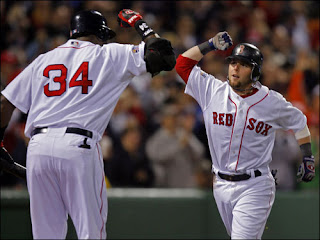When Ginger and I fly, she always takes the window seat and I always opt for the aisle, which means, from time to time, someone unrelated to us sits in the middle. Last night on the flight home from Texas, a rather chatty woman sat between us and covered a wide variety of subjects from her husband’s impending trip to Iraq to do software work for the Department of Defense to her church in Austin. At one point, she was talking about something that had happened at the church and she said, “I went to the pastor and said, ‘If you don’t want people to dwell on the past you’ve got to show us what’s next.’”
While she continued talking, my mind wandered off on a journey of its own. We were flying back from Texas because we had flown down on Friday for three events that were all something other than “what’s next”: my brother’s fiftieth birthday (or, at least when we could celebrate it), my dad’s eightieth birthday (same scenario), and my thirtieth college reunion – all three markers that gave me pause to look back more than forward.
Those words, however, are not enough. When it comes to time, we lack for sufficient vocabulary. When we convince ourselves time is linear, we’re working with a deeply flawed metaphor. This is a line:
________________________________________
It lies flat on the page and runs in two directions. If you want to be generous, you can say it has two dimensions, but only if you draw a really fat line. Time is so much more. Think about the verbs we use. We save time, lose time, make time, waste time, have time, take time, and – on weekends like the one I just lived – we move through time as though it were an environment.
I’ve not been on the Baylor campus in a number of years and have not been to Homecoming in a decade. When we parked the car at the stadium on Saturday and walked across the grass to the tents for the reunion picnics, I wondered what I was in for. Ginger and I got our plates of barbeque and moved toward the tent and the first two people I saw were Al and Keith, pledge brothers, who called my name and hugged me and the years disappeared with their welcome. It was not about how long it had been as it was about being, together. We had missed much of each other’s lives (they had children, now out of college, I had never seen) and we found the gossamer strands of friendship still tethered us. For the next couple of hours, I talked with folks whom I had not seen in years, picking up conversations we had laid down and continuing on.
Webster says a reunion is “an assembling of persons who have been separated.” And so it is. We walked through time, across time, even out of time to find one another on the field we had walked together long ago, and, as we stood, we grew back together. Rumi wrote,
Out beyond ideas of wrongdoing and rightdoing,
There is a field. I’ll meet you there.
Time is a field, where we can meet and re-member ourselves, reunite ourselves, not looking only for what is next, but for all that ties us together. The day was filled with good things, yet I would have made one change. I would move Homecoming to March, so that we could have stood together in the field, surrounded by bluebonnets.

